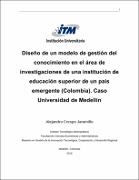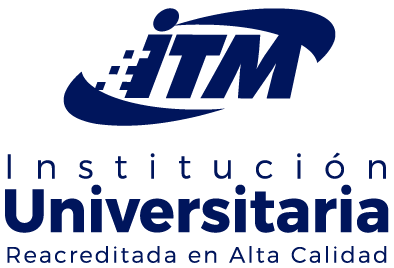Diseño de un modelo de gestión del conocimiento en el área de investigaciones de una institución de educación superior de un país emergente (Colombia). Caso Universidad de Medellín

Ver/
QRCode
Compartir
Fecha
2015Autor(es)
Director(es)
Publicador
Instituto Tecnológico MetropolitanoCitación
Metadatos
Mostrar el registro completo del ítemDocumentos PDF
Resumen
El trabajo de grado tiene como propósito diseñar un modelo de gestión del conocimiento enfocado el área de investigaciones y validado en facultad de Ciencias Económicas Administrativas de la Universidad de Medellín, pretendiendo apoyar el logro de la competitividad de los grupos de investigación de la facultad en el contexto regional.
El desarrollo de este trabajo se debe a la disminución de proyectos y productos de alto impacto de los grupos de investigación y de la poca colaboración en el trabajo conjunto de los investigadores, para la producción de conocimiento científico, por ello es necesario diseñar un modelo de gestión del conocimiento el cual ayude a mejorar los procesos y procedimientos dentro de los grupos para generar, almacenar, transferir y utilizar el conocimiento generado y que este impacte positivamente a la sociedad.
La metodología a implementar es un análisis interno del capital intelectual de la facultad en el área de investigaciones en el cual se van a identificar los conocimientos críticos existentes en la organización, y como dentro de ella está integrado o implementado el ciclo del conocimiento (como identifican, crean, almacenan, comparten y utilizan el conocimiento), mirando los procesos administrativos en el área de investigaciones, los investigadores, cuáles son los facilitadores y las barreras para el flujo constante de conocimiento, como son utilizadas las herramientas tecnológicas para la transferencia de conocimiento, como se gestionan los proyectos, productos, líneas de investigación, y las relaciones que hay con Universidades, empresas, el Estado y la sociedad. Después de realizar el análisis se van a caracterizar los procesos administrativos y se propondrá un modelo de gestión del conocimiento que ayude a la competitividad de los investigadores, Grupos y la Facultad de Ciencias Económicas y Administrativas en el área de investigaciones. El modelo será evaluado por medio de reuniones con un grupo focalizado de personas en donde se validará y se obtendrán recomendaciones o modificaciones al modelo
Abstract
The degree work has a purpose to design a knowledge management model, focused on the investigational area. To be validated in the economic science and management faculty, in the University of Medellin. Supporting the acheivement of the competitivenes of the investigative groups of the faculty in the regional context.
The developement of this work is due to the reduction of high impact projects and products of the investigative groups, and the minimal support from the investigators in order to produce scientific knoweledge. Because of this, it is necessary to implement a knowledge management model, in which helps to improve the procedures inside the groups to generate, keep, transfer and use the generated knowledge, which positively impacts society. The implemented methadology is an internal analysis of the interlectual capital of the faculty of investigations. In order to identify the critical knowledge existing in the organisation, and how the inside knowledge is integrated and or implemented, (how they identify, create, keep, share and utilize the knowledge), looking at the administrive process in the investigational area. The investigators whom facilitate, and the barriers that block free flowing knowledge, and how they use the technological tools to transfer knowledge, how they manage projects, products and investigative subjects, and the relatioships between universities, goverment and society. After the analysis, I will make a diagnosis of the administive process, after which I will propose a new knowledge management model, which helps the competiveness of the investigators, groups, the economic sciene and management faculty and the investigational area. The model will be evaluated through meetings with a focused group of people where it is validated and recommendations or modifications to the model are obtained


